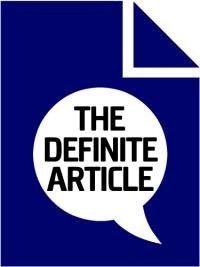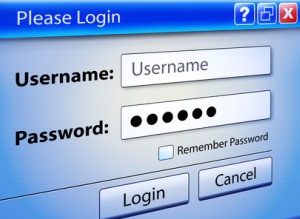‘alexithymia’ (n.): the inability to express or describe one’s emotions in a verbal manner
Author Archives: S.C. Wood
Word of the Week
‘sesquipedalian’ (adj.): 1. (of a word) polysyllabic, long; 2. long-winded or characterised by long words
Example: Lots of people know the sesquipedalian word “antidisestablishmentarianism”
Word of the Week
‘tatterdemalion’ (n.): A person dressed in shabby or ragged clothing
Word of the Week
‘buckminsterfullerene’ (n.): An extremely stable form of pure carbon which has a cage-like structure consisting of interconnected pentagons and hexagons
See if you can slip that one into your next conversation!
What’s in a (user)name?
Like most students, I’m no stranger to procrastination; it can be incredibly hard knuckling down to one task when there’s just so much interesting stuff out there. One morning not so long ago, I was finding it particularly difficult to focus. I’d already checked my emails, caught up with the latest news (via both the BBC and Facebook) and ‘spent’ an impressive £300 I didn’t have browsing on ASOS. I knew I should be starting my assignment, but no. Instead, I told myself ‘just a couple more minutes’ and turned to one of the most dangerous sites known to modern procrastinators: Youtube.
In my defence, I wasn’t intending to just trawl aimlessly through videos of animals looking cute and people making fools of themselves. I was simply going to log into my account, check my stats, and log out again. However, when I logged in and found (much to my amazement) that I’d topped 1,000 subscribers, my plan went out the window. 1,000 people, all interested in my videos! I had to take a closer look.
As I scrolled through my list of followers, I found myself thinking more and more about the usernames people had chosen. What did they say about their owners? Was ‘John123’* really just an average, slightly unimaginative bloke called John? (Quite possibly.) Was ‘catwoman23’ really the batty old lady with 23 cats who immediately popped into my head? (Perhaps not.) Names ranged from fairly unremarkable to a bit quirky to just plain bizarre, but they always, always seemed to cause me to make some sort of general assumptions about character. And those assumptions fascinated me.
Offline, we have relatively little control over our names. But online, we are given chance after chance to come up with our very own label. Pretty much every major website seems to require a username in some form or another, and in choosing that short combination of characters, we’re influencing the way we are going to be seen.
On sites like Youtube, most people won’t suffer any real harm from posting under a slightly questionable username. Okay, so a more outlandish choice might spark the odd curious/bemused/witty comment from a fellow user, but as long as it’s not offensive, it’s unlikely to cause any real problems. Elsewhere, though, and a username might be really quite significant. Take ebay, for example. Common items can be listed by hundreds of different people, all competing for business. When prices and ratings are comparable, how do you choose where to go? Personally, I look at the names. Whoever I get the best vibe from, I buy from.
It’s quite frightening, really. There are so many possibilities, and even subtle variations might prompt very different judgements. What makes it even more complicated is that it’s all so subjective. A name that sounds clever to one person might make another immediately conclude, ‘try-hard’. A more fun, playful name might seem plain childish to somebody else. It’s impossible to know how much or in what ways our usernames influence other people, but it’s worth thinking about. They may not seem like much, but at the end of the day we’ve singled out those specific combinations of characters to represent ourselves. As with all our language choices, it would be foolish to think that they don’t have any consequences.
*All usernames in this post are fictitious and are not intended to bear any resemblance to real online users.
Word of the Week
‘ecdysiast’ (n.): A striptease performer (or, more colloquially, a stripper)
Word of the Week
‘callipygian’ (adj.): Having well-shaped buttocks
(Okay, so Valentine’s Day has been and gone now, but everyone loves a compliment.)
Word of the Week
‘borborygmus’ (n.): A gurgling, rumbling or squeaking noise from the abdomen caused by the movement of gas through the intestines (… in other words, stomach rumbling!)
Word of the Week
‘syzygy’ (n.): An alignment of three celestial objects
Fun fact: This is also believed to be the only word in the English language that uses the letter ‘y’ three times!
What’s in a label?
By Jade Cook
Cosmopolitan Magazine recently posted an article featuring Remi Ray and why she’s embracing the term ‘plus-size’. In the article Remi confronts the term and explains why she’s not ashamed of the label and I agree with her; it’s not the label that causes upset, it’s the connotations it carries and the way society has attributed such an undercurrent of negativity to the term. Nowadays, the label itself is bypassed with the recipient fixating on what the speaker might have ‘really meant’. Meaning is existing in the subtext rather than the text itself – and this is the problem.
It’s undeniable that, in today’s society, there’s a certain stigma attached to being deemed ‘bigger than average’. The problem here, of course, is the definition of ‘average’ according to today’s media. The beauty industry as a whole isn’t representing actual average sized women; it’s representing an average where ‘size zero’ is one end of the spectrum and where a size 10-12 model is ‘plus-size’ if she is part of a campaign fronted by a major fashion house. This makes their version of an ‘average’ sized woman at around a size 6-8, which is part of the reason that it’s unhealthy for every woman to compare themselves to this one standard of beauty and feel that they are lacking in themselves if they cannot compete.
What I cannot stress enough is that this is neither a pro-curves article, nor an article in support of size zero. This is an article that is in support of women, an article that is asking why we are allowing labels to dictate not only how we view ourselves, but also how we view each other. If a woman is naturally ‘thin’ by label, with her hipbones slightly visible and her collarbone protruding she’ll be treated by society as though she has an eating disorder of some kind that allows her to maintain such a figure. If a woman wants to lift weights, challenge her body and build her strength she might reasonably be labelled ‘strong’, but then she’s criticised for being ‘masculine’ – and as a woman, this is of course grounds to be deemed ‘unattractive’, right? Any woman who labels herself ‘curvy’ is accused of implying that she is the epitome of ‘a real woman’, thus making any woman who isn’t curvaceous feel like she’s being called out for not being a ‘real woman’. The implications of labels are never explicitly said, but because of our incessant need to compare and judge people by what they are or what they are not, we take it that any attributes we lack ultimately make us less of a person, when they don’t.
Think of it this way: When we die, nobody writes in our eulogy what our hip to waist ratio was, nobody remembers us by the body shape we had, nobody defines our character based on the number on the scales – because it’s not important. All that labels are doing is telling somebody one quality of what we are to the naked eye; it is the connotations that we’ve associated with each label that are skewing their meaning. The labels themselves say nothing about our character, nothing about the depth we have as individuals, and yet we allow their use and how we interpret them to hinder the way we view ourselves in our entirety. Young women need to be taught the difference between the label ‘fat’ and ‘having fat’ – something that the human body cannot survive without. We should be educating women that the number on the scales takes into account the blood in your veins, the weight of the organs keeping you alive, the cells that created the body you live in, the bones and muscles that allow you to walk, run, dance and move and the water that hydrates the skin you should feel comfortable in; the kilograms in the reading are not just ‘fat’. If we learnt these connotations rather than the negative ones usually associated with the label, perhaps ‘fat’ would lose its power in encouraging us to self-loathe.
If we can accept that no two women desire the exact same lives, careers, partners, friends, adventures or possessions, then why can’t we embrace that they do not desire to look exactly the same either? We have spent years trying to empower women, trying to encourage them to see themselves as equals. We’ve told women to believe in their ambitions and to fight for what they want. Now it seems we are reversing our hard work by disempowering them with not the labels, but the house of negative associations we’ve built and continue to build around each one. Now every label that doesn’t have the connotation of ‘perfection’ is subliminally saying ‘you aren’t good enough’, ‘your size is holding you back’, ‘you should be ashamed if this label applies to you’, ‘your weight overshadows anything you achieve’ – where is the sense in that? We’re creating a generation of women who are never content with who they are, women who feel they are constantly required to better themselves aesthetically.
As Remi Ray stated in her interview, ‘It’s not the vocabulary that’s standing in our way, it’s how the plus-sized community is perceived by the public (and more importantly, by its own members).’
So I stand to call an end to giving this issue anymore airtime, for the sake of the women suffering at the hands of these apparent ‘meanings’ that are encoded in every label, ready to dictate to them on some level that they are inadequate. For the sake of the pre-teens who’ve yet to discover the scale of this war on size we’re currently in and for every person who has fallen victim to the bullies in school corridors or work places, on the streets or in the club, who believe it is their place to tell you why you’re one thing and not another. What I find saddening is that we’re the ones falling victim to this process of comparison, we’re the ones inferring what each label means, therefore we are effectively the only people responsible for the power each label now has. ‘Curvy’ only means you have curves in the outline of your body, it doesn’t mean ‘a polite way of saying you’re overweight’ the same way that ‘athletic’ doesn’t mean ‘lacking femininity’ and ‘plus-size’ doesn’t mean ‘fat and disgusting’.
Pity those who cannot embrace the beauty of difference and think of the misery they will endure for as long as they are fixated with conforming to one standard of beauty. If I can leave you with any thought at all it would be this:
‘If tomorrow, women woke up and decided they really liked their bodies, just think how many industries would go out of business.’ – Dr. Gail Dines.

